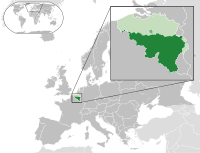Belgium's French Community
|
French Community of Belgium Communauté française (French) |
||||
|---|---|---|---|---|
| Community of Belgium | ||||
|
||||
|
||||
| Country | Belgium | |||
| Established | 1980 | |||
| Capital | Brussels | |||
| Government | ||||
| • Executive | Government of the French Community | |||
| • Governing parties (2014–2019) | PS, cdH | |||
| • Minister-President | Rudy Demotte (PS) | |||
| • Legislature | Parliament of the French Community | |||
| • Speaker | Philippe Courard (PS) | |||
| Population | ||||
| • Total | 4,500,000 | |||
| Celebration Day | 27 September | |||
| Language | French | |||
| Website | www |
|||
| The Walloon flag was chosen as flag of the French Community of Belgium in 1975. It was adopted by the Walloon Region in 1998. | ||||
In Belgium, the French Community (French: Communauté française); (French pronunciation: [kɔmynote fʁɑ̃sɛz]) refers to one of the three constituent constitutional linguistic communities. Since 2011, the French Community has used the name Wallonia-Brussels Federation (French: Fédération Wallonie-Bruxelles), which is controversial because its name in the Belgian constitution has not changed and because it is seen as a political statement. The name "French Community" refers to Francophone Belgians, and not to French people residing in Belgium. As such, the French Community of Belgium is sometimes rendered in English as "the French-speaking Community of Belgium" for clarity.
The Community has its own parliament, government, and administration. Its official flag is identical to the Walloon Flag, which is also the official flag of the Walloons of Wallonia.
Wallonia is home to 80% of all Francophone Belgians, with the remaining 20% residing in Brussels, which is the seat of parliament of the French Community.
Historically, this community spoke variants of Walloon, Flemish, Picard, Luxembourgish or Moselle Franconian German, but nowadays, the dominant language is overwhelmingly Belgian French, except for some areas alongside the border to the Grand-Duchy of Luxembourg (mainly the district called Land of Arlon or Arelerland), where Luxembourgish is still widely spoken.
...
Wikipedia



